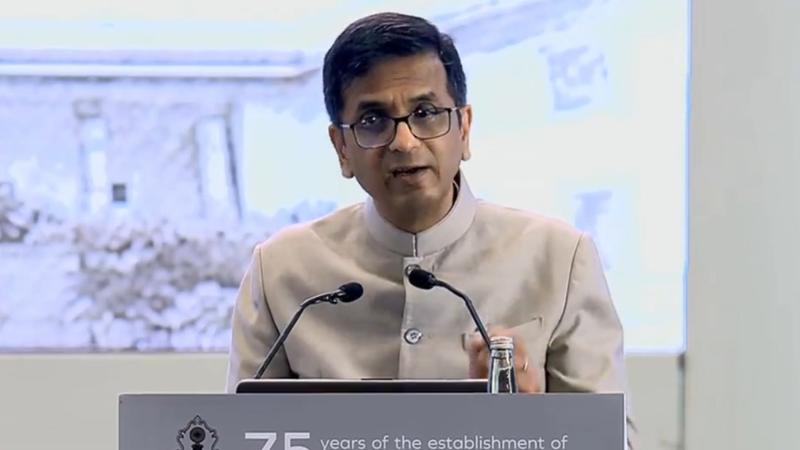Published 22:05 IST, September 21st 2024
CJI Chandrachud Calls for Greater Awareness and Support for Rare Diseases in Society
CJI Chandrachud on Saturday emphasised the need to create awareness about rare diseases in society, by being empathetic and supportive to such parents.

Bengaluru: Chief Justice of India DY Chandrachud on Saturday emphasised on the need to create awareness about rare diseases in society, by being empathetic and supportive to such parents and their families regardless of cultural, religious, or traditional barriers.
He said we can no longer afford to be unaware of genetic diseases.
India’s Unique Burden of Rare Diseases
Citing the National Policy of Rare Diseases launched by the Ministry of Health and Family Welfare in March 2021, he said that further research is necessary to define the definition of rare diseases and stressed the need to ensure equitable access to advanced medical therapy like gene therapy in a diverse nation like India.
Speaking at the conference organised by Narayana Nethralaya Foundation on Gene therapy and precision medicine, Justice Chandrachud noted, "In a country like India, home to the largest population in the world with over 4,600 distinct population groups, many of which are endogamous, we face a heightened burden of rare diseases. Unfortunately, these innovative therapies remain largely unavailable in India and other low and middle-income countries. This is a situation which has to change." Mentioning the country's first home-grown gene therapy for cancer which was launched by President Droupadi Murmu in April, the CJI said, that CAR T cell therapy has often been inaccessible globally due to its prohibitive costs.
"But the therapy introduced today is not only revolutionary but also represents the world's most affordable CAR T cell treatment, embodying the spirit of the Make in India initiative. While this innovation sparks, we face a pressing challenge ensuring access to such treatments for all patients, particularly those in underserved regions," he said.
Healthcare Barriers for Marginalised Communities
He also noted how people from marginalised communities face persistent barriers in accessing healthcare.
"Social determinants of health factors outside the healthcare system, such as class, caste, gender, and regional location, often play a significant role in determining an individual's health status. Injustice in healthcare becomes evident when we view individuals not merely through the lens of clinical symptoms but by understanding their social determinants of health. This reality highlights a pressing need for targeted interventions that address these systemic barriers," he said.
Access to Essential Treatments: A Right Under Article 21
The CJI also emphasised how access to essential treatments is a fundamental aspect of the right to health, along with Article 21 of the Constitution (protection of life and personal liberty) and the need to devise strategies that enhance access to cutting-edge precision diagnostics and gene therapies across the nation.
He said raising awareness among healthcare providers and patients about available treatments and ongoing clinical trials can empower more individuals to seek and receive appropriate care.
To truly address accessibility, we must confront the third key issue, which is affordability.
Efforts to Reduce Costs and Expedite Access
Recently, in a batch of petitions filed by parents of children with rare diseases, the Delhi High Court clarified that customs duties and charges should not be levied on medicines, drugs, and therapies for rare diseases, urging customs authorities to ensure these items are cleared expeditiously without unnecessary delays.
"These initiatives signify progress in our efforts to improve access to essential treatments. However, to effectively address these challenges, we must prioritise the development of indigenous technologies specifically tailored to our patient population. This involves building partnerships between research institutions, pharmaceutical companies, and the government to promote innovation in the creation of affordable therapies," he said.
He said the government must stand behind our innovations in the treatment of rare diseases, putting its spine behind the evolution of technology.
A Multi-Faceted Approach to Supporting Gene Therapy
"Support for the advancement of gene therapy and rare diseases treatment requires a multi-facility approach. There are three essential types of support which are needed first for any progress to take place. The first step is societal awareness. The general public must become more knowledgeable, empathetic and supportive of rare diseased patients and their families, regardless of cultural, religious, or traditional barriers.
We can no longer afford to be unaware of genetic diseases," he stressed.
Therefore, raising awareness across society about the realities of these diseases is crucial for building a culture of support, he said.
"Second, the collaboration between the public and private sectors, as well as partnerships with global biotech and pharmaceutical giants has fostered a favourable environment for innovation in India to further promote innovation in gene therapy and rare diseases, the industry must step up its support through corporate social responsibility initiatives or direct investment in startups," Justice Chandrachud said.
He also noted that to encourage more industry participation, there should be proposals for tax incentives and benefits, especially since the market for their disease treatment is relatively small.
(With PTI inputs)
Updated 22:05 IST, September 21st 2024




